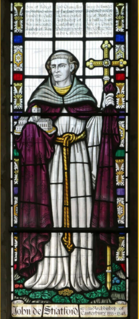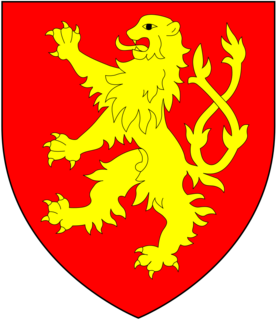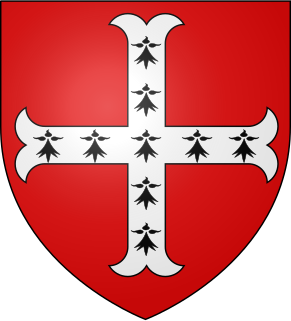Related Research Articles

John de Stratford was Archbishop of Canterbury, Bishop of Winchester, Treasurer and Chancellor of England.
Marmaduke Lumley was an English priest, Bishop of Carlisle from 1429 to 1450, and Knight Commander of the Order of St. John of Jerusalem. He was a son of Ralph de Lumley, 1st Baron Lumley and Eleanor de Neville. He was elected about 5 December 1429, and consecrated on 16 April 1430. He was Bishop of Lincoln for a short time before his death in December 1450. He was educated at University of Cambridge and was appointed Precentor of Lincoln Cathedral in 1425. He also became Chancellor of the University of Cambridge in 1427 and was Master of Trinity Hall, Cambridge from 1429 to 1443. From 1446 to 1449 he served as Lord High Treasurer of England. Lumley's tenure as Lord High Treasurer occurred during the Great Bullion Famine and the Great Slump in England.

Henry Burghersh, was Bishop of Lincoln (1320-1340) and served as Lord Chancellor of England (1328–1330). He was a younger son of Robert de Burghersh, 1st Baron Burghersh, and a nephew of Bartholomew de Badlesmere, 1st Baron Badlesmere. He was educated in France.
John Langton was a chancellor of England and Bishop of Chichester.

Antony Bek was a bishop of Durham and the Patriarch of Jerusalem.
William Alnwick was an English Catholic clergyman. He was Bishop of Norwich (1426–1436) and Bishop of Lincoln (1436–1449).
Thomas Bek was the Bishop of Lincoln from 1341 until his death. He was a member of the same family as Antony Bek, Bishop of Durham, and Thomas Bek, Bishop of St David's.
Thomas Brunce was a 15th-century Bishop of Rochester and then Bishop of Norwich.
John Russell was an English Bishop of Rochester and bishop of Lincoln and Lord Chancellor.

Robert de Stratford was an English bishop and was one of Edward III's principal ministers.
Ralph Walpole was a medieval Bishop of Norwich and Bishop of Ely.

John Hotham was a medieval Chancellor of the Exchequer, Lord High Treasurer, Lord Chancellor and Bishop of Ely.
Richard de Wentworth was a medieval Bishop of London.
Thomas Blunville was a medieval Bishop of Norwich.
Simon Walton was an English clergyman who served as the Bishop of Norwich.
Roger Skerning was a medieval Bishop of Norwich.
William Ayermin was a medieval Bishop of Norwich.
Thomas Hemenhale was a medieval Bishop of Norwich-elect and then Bishop of Worcester.
John Wakering was a medieval Bishop of Norwich.
John Salisbury, O.S.B. was a Welsh clergyman who held high office in the pre- and post-Reformation church in England.
References
- Fryde, E. B.; Greenway, D. E.; Porter, S.; Roy, I. (1996). Handbook of British Chronology (Third revised ed.). Cambridge: Cambridge University Press. ISBN 0-521-56350-X.